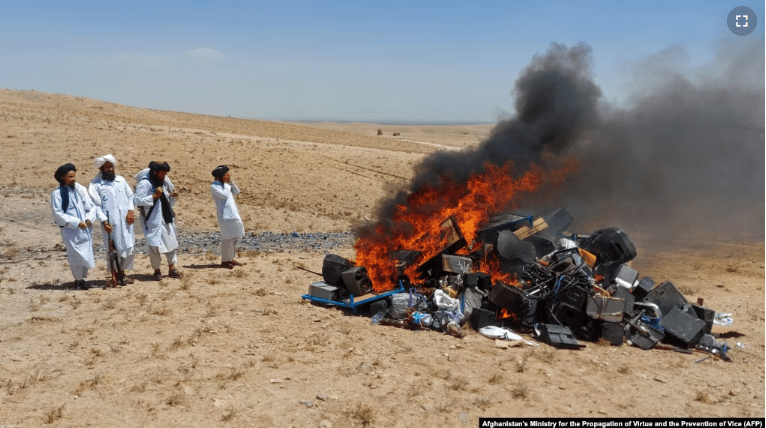The Azadi Briefing: Thousands Of Afghans Are Detained By Taliban’s Morality Police

I’m Abubakar Siddique, a senior correspondent at RFE/RL’s Radio Azadi. Here’s what I’ve been tracking and what I’m keeping an eye on in the days ahead.
The Key Issue
The Taliban has revealed that its notorious religious police detained more than 13,000 Afghans during the past year for violating the extremist group’s morality laws.
The Ministry for the Promotion of Virtue and Prevention of Vice, which oversees the religious police, said those detained had violated the group’s strict Islamic dress code and gender segregation in society.
Other violations, the ministry said, included gambling, the use of illicit drugs, and playing or listening to music, which is banned.
Muhibullah Mukhlis, a ministry official, said on August 20 that the Taliban had “confiscated and destroyed” over 20,000 musical instruments and closed 25 bars across the predominately Muslim country in the past year.
He also added that nearly 300 Taliban members were fired from their jobs for trimming their beards, which is also banned.
Why It’s Important: The Taliban’s religious police have been accused of creating a “climate of fear and intimidation” in Afghanistan.
The force has publicly punished offenders, often violently. Men and women convicted of violating the Taliban’s morality laws have been jailed or publicly flogged, often in fields or sports venues.
“We are terrified and cannot celebrate anything,” said a resident of the northern province of Parwan, where the Taliban publicly destroyed confiscated musical instruments on August 20.
“If we celebrate, the Taliban’s morality police beat and humiliate us,” he told RFE/RL’s Radio Azadi while requesting anonymity because of concerns over his safety.
What’s Next: The Taliban’s dreaded religious police are likely to remain a cornerstone of the extremist group’s brutal rule.
This week, the Taliban’s spiritual leader, Mullah Haibatullah Akhundzada, issued a decree that expanded the powers of the religious police.
What To Keep An Eye On
The Taliban has banned UN’s Special Rapporteur on Human Rights Richard Bennett from entering the country.
Taliban spokesman Zabihullah Mujahid on August 21 accused Bennett of providing “false” information about the situation in Afghanistan and spreading “propaganda.”
Bennett called the ban “a step backward” and said it “sends a concerning signal” about the Taliban’s engagement with the UN and the international community on human rights.
Bennett was appointed in 2022 to monitor Afghanistan’s human rights situation. He has traveled to Afghanistan several times and pointed to grave human rights violations, especially against Afghan women and girls.
Afghan and international human rights campaigners have condemned the Taliban’s decision.
Heather Barr, associate women’s rights director at Human Rights Watch, said “the Taliban are giving up some of their last pretenses of wanting to look rights-respecting.”
Why It’s Important: While Bennett will still document rights abuses in Afghanistan, the ban will harm the Taliban’s efforts to gain international recognition.
Despite increased international engagement with the Taliban-led government, Western nations will likely find it difficult to overlook the group’s extensive rights abuses, including denying women most of their fundamental rights and carrying out extrajudicial killings as well as the torture and ill-treatment of detainees.






